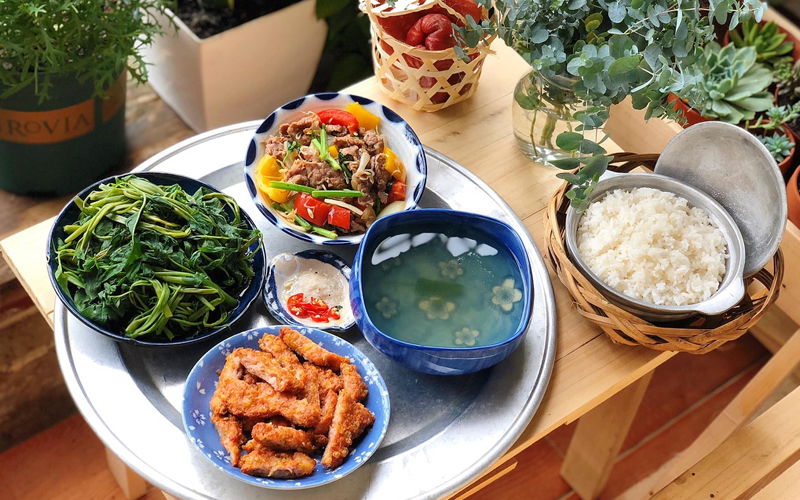In Vietnamese culture, family meals have long been an indispensable part of everyday life. However, with the busyness of modern life, these gatherings are becoming increasingly rare. What are the benefits of family meals? Are they still necessary? Let’s find out!
1. Why Have Family Meals Been Forgotten?

In the past, the man of the house would go out to work and provide for his family, while the woman stayed at home, taking care of domestic duties and cooking. The family would wait for the man to return and gather around the table to eat together. These meals were a time for all generations to come together and share laughter.
Today, with the advancements of modern society, women are also pursuing careers outside the home, and as a result, domestic duties have taken a back seat. In some families, housework is no longer considered the woman’s primary responsibility, and they rely on domestic help. Mealtimes have become less frequent and less important.
Did you know: is an international day declared by the United Nations to raise awareness of issues concerning families worldwide.

Additionally, with the advent of smartphones, people have become more absorbed in their digital lives, creating a sense of detachment from their physical surroundings. Mealtimes have become silent affairs, with each person focused on their phone, responding to messages and notifications.
Everyone leads busy lives and values their privacy, so mealtimes have transformed into individual affairs. “Eat whenever you’re free; no need to wait for anyone else,” has become a common mentality. Young people also tend to prefer socializing with friends, enjoying trendy dining experiences, and opting for fast food over traditional family meals.
These changes have contributed to the decline of the traditional family meal.
Related: extended family
2. The Benefits of Family Meals
Enhances Family Bonding

According to Sean Brotherson, Ph.D., Family Science Specialist and Associate Professor at Oregon State University, family meals provide a familiar and comforting sensory experience that engages our senses of sight, touch, taste, and smell, while also filling the air with laughter and conversation.
These shared meals create a sense of belonging and connection for all family members. Regular family meals have been shown to benefit both children and parents.
Promotes Healthy Communication

Family meals provide an opportunity for everyone to connect and engage in meaningful conversations. According to research by Barbara H. Fiese of the University of Illinois, parents can protect their family’s well-being by simply sharing meals and communicating with their family members for 18-20 minutes each day.
Barbara’s research highlights that family meals can help prevent behavioral problems in young children and reduce the likelihood of substance abuse in teenagers aged 13-19.
Ensures Nutritional Balance

Home-cooked meals, prepared with care by family members, offer nutritious and cost-effective options. Barbara H. Fiese’s research also suggests that family meals discourage excessive dining out and promote healthier eating habits.
Prevents Obesity

According to Barbara H. Fiese’s research, children and teenagers who share three or more family meals per week are more likely to maintain a healthy weight and develop healthier eating habits. This is because family meals tend to be slower-paced, allowing for better control over food intake. Additionally, children tend to eat more when dining at home compared to eating out.
3. How to Encourage Family Members to Eat Together?

To make family meals more appealing, prepare delicious and visually appealing dishes, similar to those served in restaurants. Vary the menu regularly to avoid monotony. Each meal should be a unique culinary experience that everyone looks forward to.
Everyone should make an effort to set aside time to eat together. If schedules are busy, aim for 3-5 family meals per week to strengthen family bonds.
During mealtimes, foster an atmosphere of laughter and conversation to make the dining experience enjoyable for all. Avoid criticism, judgment, or arguments during this time to keep the atmosphere light and positive.
4. Conclusion

Family meals are not just a beautiful tradition in Vietnamese culture, but they also offer numerous benefits, such as strengthening the bond between spouses and children, and fostering understanding. For older family members, these gatherings provide a sense of purpose and joy, as they look forward to spending time with their loved ones.
While it may seem challenging to maintain family meals in today’s fast-paced world, the benefits are well worth the effort. By prioritizing family meals, we can enhance our relationships and create lasting memories. Let’s not allow our busy lives to stand in the way of sharing meaningful moments around the dinner table.
. So, let’s not neglect the importance of family meals and continue to find ways to bring everyone together.







































